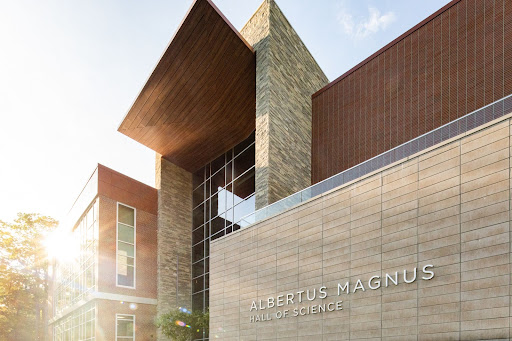Published on
The U.S. Green Building Council of West Michigan (USGBC-WM) recently announced Albertus Magnus Hall of Science as the Certified Green Building Award Higher Education winner. This award recognizes exemplary building projects that received high-performance certifications.
As part of the Award announcement, USGBC-WM stated, "When it comes to building design, laboratories can present challenges to out-of-the-box thinking. Aquinas turned the laboratories into an opportunity to focus on the health of those who use the spaces. Listening to the faculty and students, areas of learning were positioned on the outside of the building to maximize daylighting. Albertus has achieved high standards for indoor air quality while consuming half of the energy of the former building."
Aquinas College will be awarded at USGBC-WM’s Annual Party & Leadership Award Ceremony on the night of March 10th, 2022 at The Ballroom at McKay Tower in Grand Rapids.
In 2021, Aquinas announced that Albertus Magnus had earned LEED Gold certification for its many green features, including the only green roof on campus that can be used as an outdoor classroom or gathering space, energy-reducing features and more. The facility, which is home to the College's Center for Sustainability, also incorporates a white reflective roof, vegetated planters, shaded parking lot and forested surroundings to help reduce the heat island effect prevalent in cities. Other unique green features for Albertus Hall include:
- Using local materials from within a 500-mile radius of Grand Rapids, which reduced the project’s carbon footprint.
- Repurposing and reusing more than 75% of the existing building’s structure while reinvigorating dated learning spaces with new environmentally friendly finishes and technology.
- Relying on advanced ventilation systems that increase air exchanges and greatly improve ventilation and indoor air quality while saving more than $38,000 annually in energy costs.
- Providing access to natural light by placing offices, classrooms and labs on the perimeter of the building, which improves work and study conditions while resulting in 20% cost savings from reduced usage of artificial light.
- Installing low-flush toilets and automatic faucets, which are projected to reduce water usage by 40%.
- Diverting more than 90% of demolition waste from the landfill.
